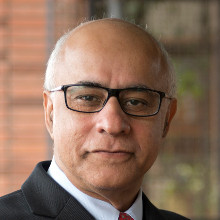[Photograph by Peter under Creative Commons]
As an entrepreneur, how do I manage risk?
In my previous column on 26 May, we spoke about the idea of risk in the context of entrepreneurship; we also spoke about the difference between risk orientation and what may constitute "risky behaviour". Today, let us look at risk from another angle as an entrepreneur begins the journey. As the business grows, a different dimension unfolds: this is not about taking risks but dealing with risks. And where do the biggest risks emanate from?
I believe the biggest risks for us are twofold: ignorance and denial. If we can handle these two, it is easier to deal with the ones that are environmental. Let us talk about ignorance first. Come to think of it, no business challenge is insurmountable if one is armed with all the information. But in real life, as business scales, the number of things you need to know about, can be overwhelming. Imagine you are not abreast of immigration laws and compliance requirements and send your employees to a foreign country. Or you are ignorant of food regulations and do not realize the MSG and the lead content in your product could land your noodle in a soup! Consider yet another kind of ignorance: what would the combined forces of mobility, cloud, social media and online retailing do to your traditional business? The list goes on.
There are three key measures every entrepreneur needs to take to deal with ignorance. Ignorance is dangerous because it can lead to risks that can drown you out first gradually and then suddenly as Ernest Hemingway said while referring to bankruptcy.
Step 1: build humility. Without humility, it is difficult to acquire knowledge.
Step 2: look at learning as a lifelong process. Great entrepreneurs are constantly learning; they learn by reading, listening, doing stuff beyond work and simply viewing things everywhere they go. To them, it becomes second nature.
Step 3: don't just continuously learn, learn from unusual sources. If you are an airline company, go see what the retail companies are doing. If you are a retail company, find out what the logistics business is doing and everyone go learn from a few non-profits that sometimes are smarter in cracking problems even business finds difficult to deal with.
Just as ignorance is a huge risk in itself, sometimes an entrepreneur is armed with all the knowledge available but is in a sad state of denial. In this state, the sense system is working but the response system is in a state of suspended animation. No one can help if an entrepreneur is in denial because these are very powerful, opinionated people who can’t be helped if they don’t want it. It is therefore important that we have a healthy paranoia, somewhat like a dietary supplement to unbridled optimism. If you do not think that things can go wrong, it is unlikely that they will go right.
The other important thing to do to prevent getting into a state of denial is to have a few critical insiders. The words are important. They are critical people but they are insiders. These are not people who are frustrated and disengaged and cynical. They are emotionally invested in you and the enterprise. At the same time, they do not tow your line.
As the business grows, just as we think about finance or HR or quality, we have to view risk as an expert function. We live in a complex, inter-connected world where there is a high probability that a low probability thing will happen. That is the reason why we have to have a structured, ongoing internal process to scan risks, assess risks, report risks, educate the rank and file on risks and then help mitigate risks. However, despite all the fortification, when sometimes things do go wrong, we need to harvest valuable lessons that can then become organizational memory. Due to these dimensions, risk management is being increasingly recognized as a corporate-level function like the other traditional ones.
Before I close, I must tell you an interesting story about managing risk. When the current government came into power, there was wild speculation that billions of dollars in foreign investments will flood India and the rupee may harden against the dollar by 10 or 15% or who knows how many percent and that could play havoc with export-oriented businesses. Many people spoke about buying insurance against such an eventuality. At that time, I spoke with a fund manager and a long-time investor in Mindtree for whom I have tremendous respect. He heard me out and then gave me a simple lesson: in unfolding situations people think there is only one variable. In reality, it is rarely that simple!
As an endnote, far from hardening as was wildly speculated, the rupee that was hovering around 59 at the end of May a year back, has weakened to 64 today!
If you have any questions mail us as askbagchi@foundingfuel.com
[This article was published concurrently in Mint]

